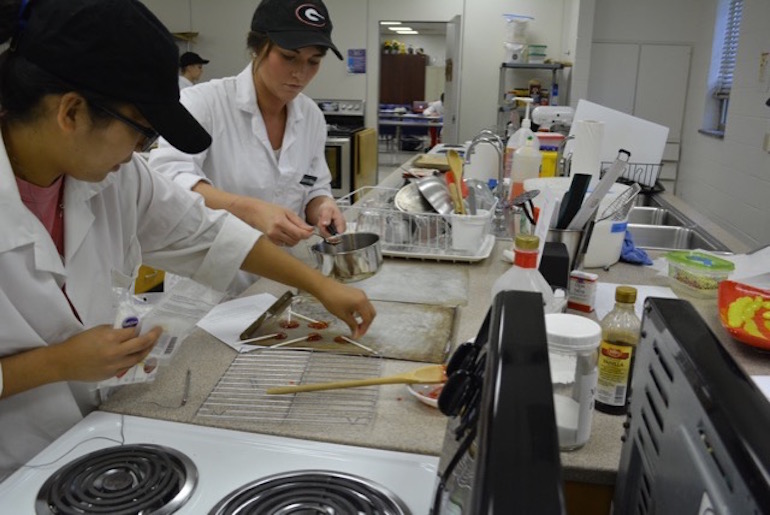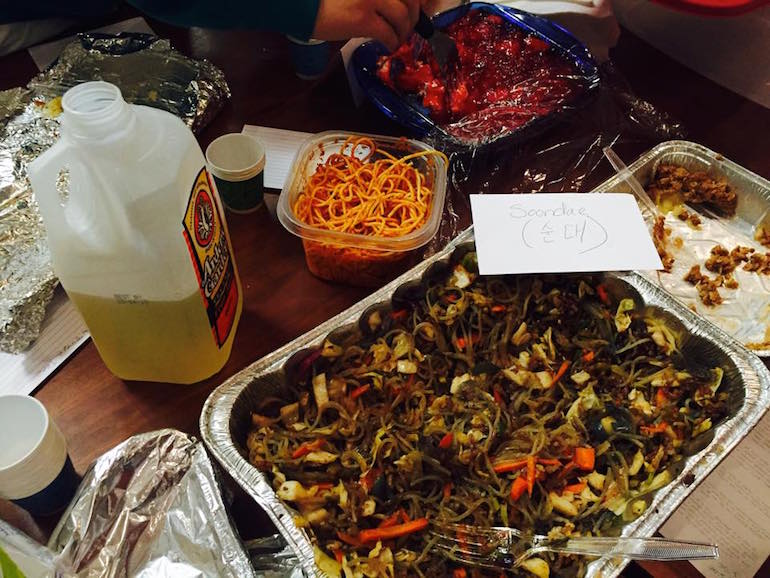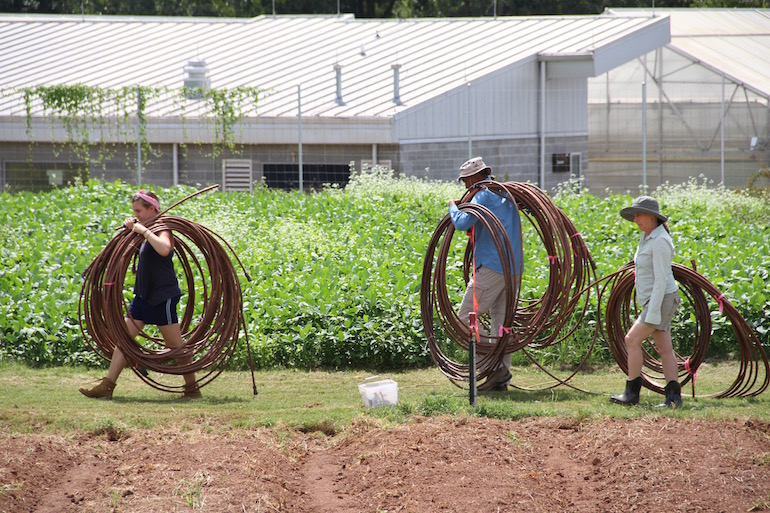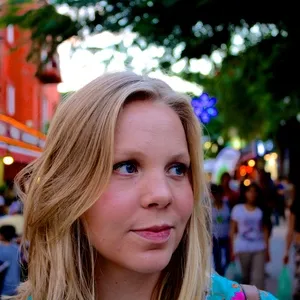Sure, you can make a mean açaí bowl, and you’re an expert in navigating Athens’ hip restaurant scene, but do you know exactly why those berries are so delicious and nutritious or what it takes to get that Mama’s Boy biscuit on your plate?
It’s time to one-up all those so-called “foodies” of our generation and hit ‘em with the smarts. Whether you just need an elective or plan to be a professional in the food world, Ole’ Georgia has a class to whet any appetite.
Haven’t taken the prerequisite but dying to take a course? Ask for permission! They’re nicer than you’d imagine.
Below are what I think are the coolest classes out there, but you can always find the full list and class times here in the trusty Bulletin.
For the Scientifically Inclined:

Photo by Zoe Schneider
FDST(MBIO) 4120: Food Fermentations
Take this to learn about how foods transform into some of our favorite yums including cheese, wine, beer, sausage, bread, and soy sauce to name a few. Not to mention, you get to make ‘em yourself and skip a class to take a Terrapin Brewery tour.
Shout out to my dawgs for making booze scholarly.
PATH(ANTH)(PBIO) 3010: Fungi: Friends & Foes
How ‘bout that for a class title? You’ll cover the biology, ecology, nutritional science, and history of fungi, like mushrooms, and their “impact on human affairs.” You’ll even learn how to, uh, watch out for the funky ‘shrooms out there. Plus, I heard it was taught by a fun guy…
FDNS 2050: Introduction to Sport Nutrition and Wellness
This course proclaims to be an “introduction to healthy eating, active living, and human performance, with an emphasis on nutrition.” Take this so you can find some sort of validation in being that basic person walking to yoga with a green smoothie. That is all.
HORT 2000: Horticultural Science
Essentially, this is plant appreciation. Learn how plants grow and what it’s like being a horticulturist. Bonus: take the lab portion of this class and get hands-on experience growing food. Then take HORT 3010, a class devoted to veggies, and HORT 3020 on fruits. Soon enough you’ll be one of those herbivores moving to Colorado for the green rush.
For the Well-Cultured:
ANTH 3541: Anthropology of Eating

Photo by Mollie Simon
In this course you’ll learn the who, what, when, where, why, and how of human food consumption-historically, biologically, and culturally. Why do some of us like it hot? Who tricked us into thinking chimichangas are from Mexico? I don’t know, but maybe you will after this class.
HIST 4020: Food and Power in American History
Take this because there’s some seriously sneaky domination in your cheeseburger’s history and in the fact that you’re eating it here in Georgia. You’ll likely gain a new perspective and hopefully make some changes in your eating habits that’ll funk up the system! Be a rebel; learn about your food.
GEOG 3660: Geography of Food Commodities
This is for all my people reppin’ the most important meal of the day. That’s right, a legitimate college course dedicated to breakfast. You’ll learn where those eggs, bagels, and coffee beans most likely came from, who the beautiful souls are that got it to your table, and who might’ve been duped in the process.
HORT(ANTH)(PBIO) 3440: Herbs, Spices, and Medicinal Plants
This class includes far more than that one plant you’re thinking of. It’ll give you an understanding of our physiological responses, the historical cultivation, and common uses of over 50 plants. You’ll finish the course knowing why you should put turmeric in your sauté and drink peppermint tea instead of poppin’ an aspirin.
For the Activist:
PHIL 3230: Ethics of Food
After this class you might turn into one of those people who spend the morning doing hard labor in their garden and then go to The Grit and ponder whether one can have the Chocolate Vegan Death Cake and eat it, too. Well, maybe not that extreme, but you’ll gain some valuable knowledge on ethical food consumption, policies, production, and access.
FDNS 4600: Food and Nutrition Policy
Interested in wholesome and just eating access for all? Take this class to understand food issues ranging from obesity and U.S. dietary guidelines to additives and contaminants, and even whether organic foods and dietary supplements make a difference in health.
ALDR(AFST)(LACS) 3820: Reflections on Fighting Hunger
It seems to be a buzzword these days, but it’s time such a widespread issue enters in the national conversation. Deepen your knowledge of food insecurity and ways to mitigate it through this class. If it won’t fit in your schedule, try AAEC 4720: Food Security, Economic Development and the Environment or FDNS 3200: World Hunger and Human Nutrition.
For the Experiential Learner:

Photo by Zoe Schneider
GEOG 4890: Athens Urban Food Collective
Learn the politics of food production, localization, and justice while working hands-on with projects in Athens like rooftop gardens or Real Food UGA. Give back to the rich food culture in the town we call home. It deserves it.
FDNS 3600/L: Food Principles and Laboratory
This one goes out to all you doing it big in the kitchen, whether you’re burning Easy Mac or mastering baklava. You’ll perfect your cooking skills and learn what ingredients do what for a dish. If that doesn’t sell it to you, the syllabus states, “All students are required to taste food that is presented to them.” Bam.
HORT 4030S: Sustainable Community Food Production

Photo courtesy of Douglas Bailey
Get up close and personal with UGArden and learn to organically produce veggies, fruit, mushrooms, chickens, and bees. Huge bonus: You grow your own plot and get to take your goodies home to feast! Not ready to do it on your own? Take HORT 3300: Organic Gardening or HORT 3125: Organic Agricultural Systems first to get some experience volunteering at the farm.
For the World Traveler:
EHSC 4500: Global Food Security
Travel to Costa Rica to explore the challenges developed and developing nations face to become food secure through production systems, environmental issues, and economics. Be sure to check out some traditional Costa Rican dishes while you’re there!
FDST 4150: Coffee: From Bean to Cup
During Thanksgiving break and also set in Costa Rica, this class will make you even more thankful for that cup of Joe that was the sole reason you made it to class this morning. You’ll learn Costa Rican coffee’s historical, cultural, and health impacts, visit local farms and processing facilities, and get to sample some of the best coffee in the world!
PATH(HORT)(FDST) 3050: Viticulture and Enology in the Mediterranean Region
Go to Cortona, Italy and learn the history and culture behind wine production, the botany of grapevines, how to make wine, and how to “appreciate” wine, if you don’t already. Again, cheers to my dawgs for making booze scholarly.


